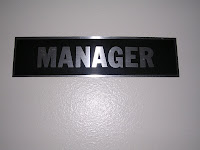Yesterday I wrote about what I think it takes to be a boss. Today, I'm going to write about what your boss wants from you.
As I said yesterday, everyone has a boss. Your boss has a boss. His boss has a boss. And so on. There is an unending circle of trust and dependence that encompasses all of us (i.e., we all have a boss).
So, what does your boss want?
I'm not saying that by following all of these guidelines that you and your boss will always see eye to eye. You probably won't. But remembering these tips can sure help.
What else would you add to this list?
Let me know.
photo credit, shrubby
Read More...
As I said yesterday, everyone has a boss. Your boss has a boss. His boss has a boss. And so on. There is an unending circle of trust and dependence that encompasses all of us (i.e., we all have a boss).
So, what does your boss want?
1. Solutions
I'm sure you've heard this before, but your boss wants solutions, not just problems. Sure it's your boss' job to help provide solutions, but it's your job too. Why to you think you were hired? How do you like it when someone comes to you with a problem, but no suggestions on how to solve it. Now think about how that would feel if it happened constantly, every day. It IS important that you let your boss know about problems. The flow of information is key, but it's also important that you bring a solution. If your boss is the only one doing the thinking, then what value are you adding to the mix? When you bring a problem, bring a solution with you. It may not be the right one, but it's better than coming in empty handed.2. Multiple viewpoints
When you talk to your boss, it is important to bring your perspective to the situation. Your boss probably depends somewhat on your eyes and ears. Your insights are important. But you also need to make sure that you can see your boss' perspective on things. If you can't see each situation from both the trenches and from a leadership point of view, you aren't adding any value. Make sure you at least try to see things from your boss' perspective. This will help both of you.3. Brevity
There is a reason why a document abstract is also called an "executve summary". It's because your boss often needs to get a quick overview of a situation. If your boss needs more information, he or she will ask you questions or read further. It's very important to be able to present a quick overview of the "lay of the land" at first. For your boss, context is often more important than detail.4. Directness
This may be just another form of brevity, but I'm adding it in to my list anyway. A boss usually wants you to be direct. Worry more about communication than sparing anyone's feelings. Bosses have usually developed a pretty thick skin. If they haven't, they will. If you have a comment. Present it. Don't hold back. If you have a question. Ask. Don't apologize for asking. If you need something to do your job. Make the request. Don't over justify. Every good boss will solicit questions, comments, and requests. Don't be afraid to speak up. Communication is a two way street.I'm not saying that by following all of these guidelines that you and your boss will always see eye to eye. You probably won't. But remembering these tips can sure help.
What else would you add to this list?
Let me know.
photo credit, shrubby












